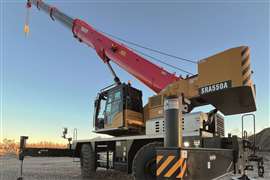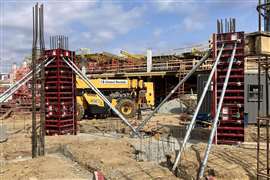Zeppelin Rental: no retreat from the rental market
14 August 2013

Murray Pollok talks to Zeppelin Rental's Wolfgang Hahnenberg and Peter Schrader on the company's Bauma stand.
At the end of an exhausting week at Bauma you could forgive Wolfgang Hahnenberg and Peter Schrader for looking a little jaded, after all, the theme of the Zeppelin Rental stand is a Munich beer hall and the first five days of the show has seen the pair entertain a large number of thirsty customers.
If they are tired they hide it well and in fact appear invigorated by the signals they have been receiving from their customers after a difficult first quarter, impacted by poor weather. “We have a little more hope for the coming months”, says Mr Schrader, “now we know more about what to expect.”
A slow start to the year was a minor set-back for many of northern Europe’s rental companies, but having spoken to customers all week, Mr Hahnenberg shares the views of his co-managing director; “Customers are in a good mood, catching up revenue from the first few months of the year, which were a little weak. We are very confident that we can catch up revenue in the second quarter.”
Weather is one of the short term issues that all rental companies have to deal with, but the two-men have more important long term considerations. Rebranded last year as Zeppelin Rental – the old MVS brand no longer as valuable as it was when Zeppelin acquired the Berlin business more than a decade ago – the company is now part of Zeppelin Group’s Rental business unit.
Does this signifies a closer alignment for the rental business with its parent company, Caterpillar dealer Zeppelin, and a possible ‘folding in’ of the rental business within the much larger Cat dealership. After all, several other Cat dealers in Europe have downsized their rental businesses, removed some of the non-Cat allied products, or even sold them (Hewden and Bergerat Monnoyeur spring to mind).
“That wasn’t the reason for the rebranding”, says Mr Hahnenberg, a long-time Zeppelin employee who has worked in many parts of the business, “The reason was to become closer to the whole Zeppelin group, not an alignment with the Cat dealership, but with the whole company.”
“I can’t talk for the other dealers”, he continues, “but we want to be and are a real rental company. So we need a good product mix – construction equipment and all the other products. We are not a dealer. We are profitable, we will grow the business and we will follow the trend [towards rental].”
Mr Schrader adds that the broad rental product portfolio – the strategy chosen when it acquired MVS – “has been the main reason why we have been successful in the last 10 years.”
The relationship with the Zeppelin dealership has benefits for Zeppelin Rental in terms of its service and maintenance expertise and also Zeppelin’s used equipment operation. Zeppelin Rental has its own used equipment department, but the Cat machines in the fleet are re-marketed by the dealer, which helps maximise the values of the machines and removes some of the logistical headaches for the rental business.
The scale of investment in the business helps reinforce the view that a retreat from rental is not on the cards. Last year the company invested more than €140 million in its fleet and although 2013 will see a slight drop, it will still be close to the €100 million mark, split roughly 50/50 between Caterpillar equipment and allied products. That represents a very healthy endorsement of the rental sector by Zeppelin.
“We are trying to grow the business in all areas and product lines, and a little bit faster in allied equipment”, says Mr Hahnenberg. These allied products include things like lighting towers, power (80 kVA and below), modular space, traffic management equipment and aerial platforms – the company has a fleet of more than 1000 units, including a sizeable number of low-level platforms from Italy’s Braviisol.
The investment will help the business achieve its goal of consistently growing faster than the market, at around 10% per year. The company reckons that this year the overall German rental market will grow by between 3 and 5%, and it sees continued growth of the market. Revenues last year were €288 million, placing it at number 30 in the latest IRN100 (see this issue) and in Europe’s top ten.
“Today rental is part of the business model of our customers, that is what has changed [from the past]”, says Mr Hahnenberg, “Rental penetration has changed from 20% to nearer 40% now. Customers are looking for flexibility – they don’t want to manage utility machines for all their job sites on their own, that’s what is driving the demand for rental.”
Part of the 10% growth will come from additional locations in Germany. The network comprises 108 stores at the moment; “We are increasing the number of stores again – we started this process two years ago”, says Mr Hahnenberg, “Last year we opened five or six – 9 in all countries – and we are planning new branches this year [around five].”
Although the bigger network and larger fleet will play a part in the growth, Zeppelin also has an extra card to play, launching a new rental business, Zeppelin Industrial Services, targeting industrial customers.
The new division, a sister company to Zeppelin Rental within the Rental business unit, is based on the acquisition of a company called GSL, based in Hünxe near Essen, which rents specialist equipment to the industrial sector, including welding tools, non-destructive testing equipment and lifting products. GSL had been in this business since 1997.
Peter Schrader says the Industrial Services business will co-located with existing Zeppelin branches, but doesn’t need the same kind of coverage as the general rental business and will function more using a fleet of mobile vans that will visit major industrial sites, as well as establishing temporary locations on sites.
Mr Hahnenberg says a big benefit of this will be the new customers and opportunities that this business will bring to the mainstream Zeppelin rental operation, in particular for things like modular space.
This new business also gives Zeppelin access to the kind of ‘tool hire’ operation that is commonly seen in the UK, for example, renting power tools and other small items. As Mr Hahnenberg says; “With GSL, now Zeppelin Industrial Services, we already have what we can call tool hire, with wrenches and screw drivers. There are not many smaller things that you could rent.”
At present this is still a modest business, with annual revenues of less than €10 million, but Zeppelin is hoping that it will grow to €50 million within five years, which would account for almost a third of Zeppelin anticipated growth over the next half-decade.
This initiative is part of a wider shift towards non-construction markets that has been underway for many years, says Mr Schrader; “If you look at our assets, you can see that we have a clear focus on these other industries. Construction is important, but also industrial and events – it’s not so new [for us].”
There are other opportunities as well, says Peter Schrader, including modular space, which illustrates a shift towards renting ‘solutions’ rather than just products; “Modular space is a good example. We don’t just rent a container or a box, we rent fully prepared offices for two years. We have built a whole university. There is now a lot of demand for refurbishing schools and nurseries. We can offer temporary schools while the refurbishment is going on.”
The company is also offering something like a consultancy service to some of its clients, looking at issues such as machine use, traffic management, site buildings. “We do planning for customers, the necessary legal requirements, deal with local authorities and government”, says Mr Schrader.
Zeppelin also has rental operations in the Czech and Slovakian Republics as well as Austria and the north west part of Russia. In addition its parent company holds Cat dealerships in the Ukraine, Tajikistan, Turkmenistan and Uzbekistan, Belarus and Armenia, although Zeppelin Rental has no rental involvement in these territories yet.
The focus in these markets is on growing the Russian operation, where there are already five locations (co-located with the dealership) and one new dedicated rental facility opening this year. In rental model here is rather different, focusing only on Caterpillar equipment, with a fleet now numbering 300 machines and mainly in larger sizes.
“Last year we added 100 machines to the fleet”, says Mr Hahnenberg, “No BCP (Building Construction Products), so all are 15 t or bigger machines. This year it will also be around 100 machines that we will add. Mainly they are rented with operators in Russia.”
But Germany remains the key market for Zeppelin Rental. Both men say that acquisitions are a possibility, but that there are no big deals on the horizon. Baurent would have represented an opportunity before it was sold to Boels Rental, but Peter Schrader says there was too much overlap and not enough volume to make it a prime target.
While Germany represents a big market opportunity, it is interesting that it does not yet exhibit some of the trends evident in other markets, such as online renting. “We’re thinking about it of course, but we don’t know how fast it will move forward – customer demand seems to be very low”, says Mr Hahnenberg.
“We asked our customers about it a few weeks ago, and they were not keen on it. It’s rather typical: after something has been in the US or UK for five years, then it shows up in Germany.”
Neither has the ‘green’ agenda in rental gone very far. Zeppelin Rental offers an ‘Eco’ line of products to its customers, but so far the take-up has not been dramatic. Peter Schrader says there is not yet such a large demand for this kind of equipment, which tends to be a bit more expensive; “Customers are very often not open to paying more for equipment. I hope in two or three years we will see an increased expectation for such equipment – we are hoping for that and we are prepared.”
These kinds of things can wait, however, if fundamental demand is at a reasonable level. On this, both are optimistic. Wolfgang Hahnenberg acknowledges that there are “global business risks” for the economy and uncertainties over the Eurozone, but says despite that business confidence in Germany remains good and he cites recent surveys that show confidence at the highest level since 1993.
Peter Schrader says in the last two or three years Germany “has had a pretty stable situation. We have a tremendous demand for construction and for works related to energy and changes in energy policy. So there are many opportunities for our business.
“If you speak to customers – medium sized and also small customers in housing and renovation, they are full or over-booked.” A bit like Zeppelin’s Bauma beer garden.






